How to celebrate the Chinese New Year in an IT-company
Chinese New Year's traditions are very different from Russian. We tell and show how they decorate the office and entertain employees at UCWeb.
New Year in China is celebrated with the arrival of spring. There is no exact date, each time it is calculated according to the lunar calendar. New Year's Eve falls on the second new moon after the winter solstice on December 21. This time the festive week lasted from February 18 to 24.
According to the legend, the monster Nyan (年, nián, “year”) got into the habit of visiting the village every New Year. Nyan devoured livestock and unwary children. The Chinese decided that the well-fed monster is a harmless monster, and every year they left him food at the entrance doors. One day, Nian got scared of a child in red clothes. Residents quickly realized, and instead of feeding the monster, began to scare him away with red lanterns and fireworks. The nannies left, and the tradition remained.
Our company began preparing for the New Year back in January, when they held an annual corporate event.
In honor of the decade, UCWeb marked the end of the year with a special scale. The company rented a hall with a stage in the Pazhou Exhibition Complex, where the Canton Fair is usually held. The holiday came colleagues from Russia, Indonesia, India and Vietnam.
')
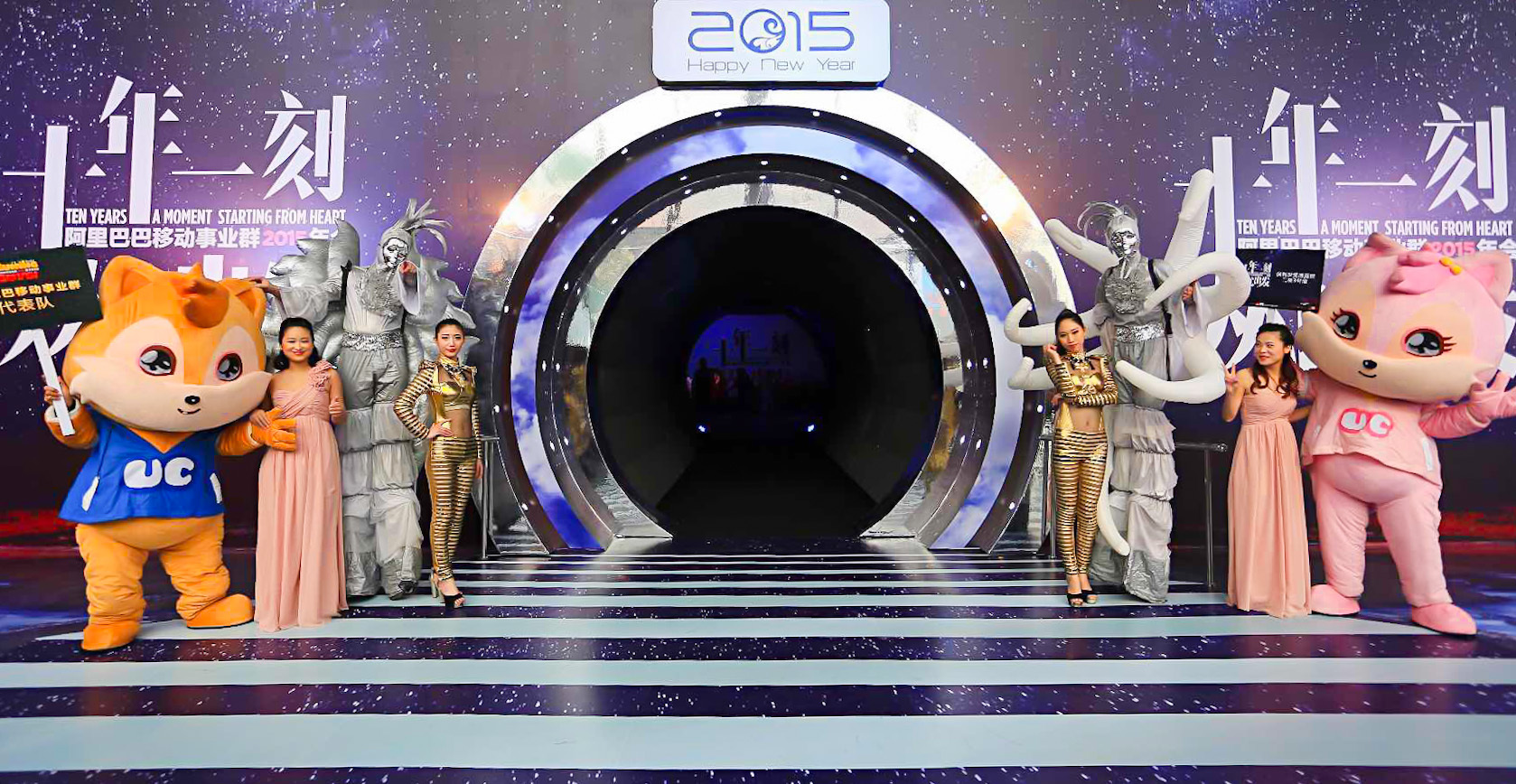
On the stage, summed up and played out gifts. The best employees were given Audi A4 cars. Each department of the company prepared a performance: they danced in bright costumes, sang, showed a theater of shadows and performances based on fairy tales and old school games.
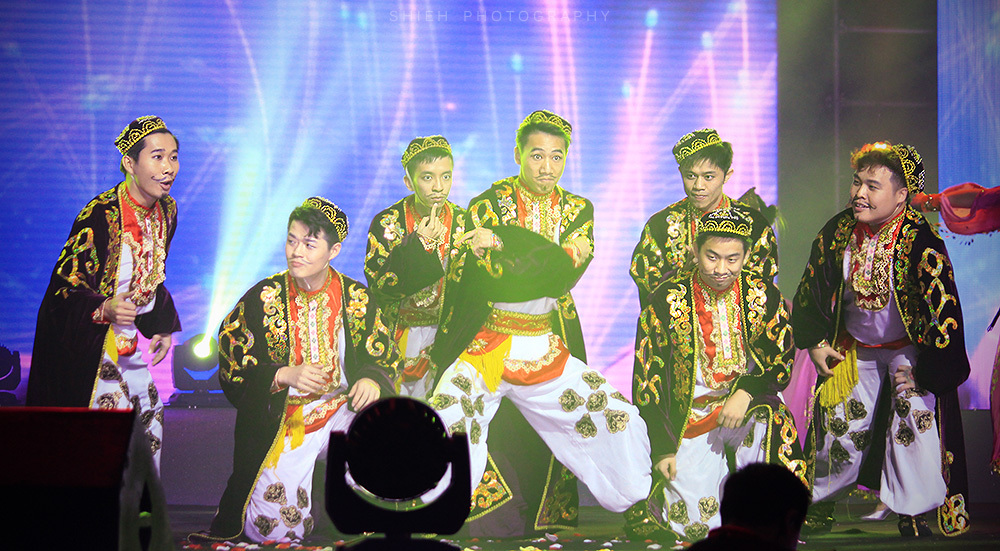


Gifts played in the lottery. The names of all employees were entered into the database, and randomly selected the winners. There were three lotteries in total, each with several types of gifts - they started with cameras and smart watches, then there were mirror cameras and Apple gadgets, and the most successful employees got a trip to any part of the world. According to our calculations, prizes were won by about 600 people. After the event, everyone went to a gala dinner at the hotel. The evening ended in karaoke, he is very loved in Asia.

On the screen the names of the winners in one of the lotteries.
New Year in China is a state holiday, and the country is resting for a week. Many are returning home to families, and the big cities are emptied to the delight of tourists. A week before the New Year, red lanterns are hung on the streets, tangerine trees are set up, and festive buildings with wishes for a good year. Trees are wrapped with festoons and golden paper. The main principle: should be bright.
At the entrance to our office we built an installation with goats.
We asked our Chinese colleagues what the year of the goat meant to them. The answer disappointed us: every year the Chinese zodiac is given less and less significance. For young people, the goat and other symbols of the year are rather decorations. They do not dress up in blue for the New Year, and do not decorate the holiday table with hay.
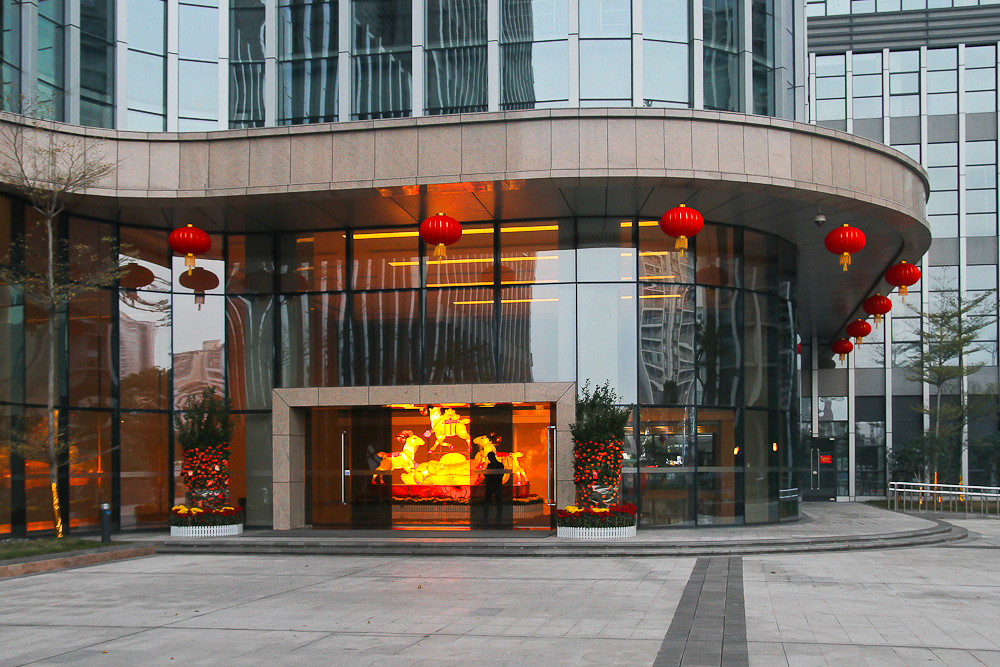

Mandarin trees decorate the "Hongbao" (红包, hóngbāo, red envelope) with wishes. We will tell about them further.

Lanterns and traditional decorations were hanged in the dining room - images of goats in national costumes, pendants with carps and knots for good luck.



As in Russia, one cannot simply celebrate and celebrate New Year without tangerines. And if we have mandarins have become a tradition for economic reasons, then everything is easier in China. In Chinese, the word Mandarin (桔子, jízi in the Cantonese dialect in the south of the country) sounds almost like “luck” (吉利, jílì), so the more mandarins the better. They are given to each other, sacrificed to the gods in the temples, they eat at lunch and decorate them at home.

In China, they like lotteries and everything related to money and gifts. Before the holidays for the employees launched the application. Participants downloaded photos, and the app automatically rated them. The one who scored more than 90 points received a souvenir with corporate symbols.

Below the photos, the first line with asterisks shows how lucky it is in love, below is luck in money and the last one about health.
After the New Year, we had another lottery. Each employee sent a letter with individual numbers. The main prize was five million yuan (almost 50 million rubles), and the entire prize fund is more than ten million.

Win: 5 yuan (about 50 rubles at the current rate).
And now about the Hongbao. On the New Year, the Chinese exchange envelopes with money for happiness and good luck. There is another tradition here in the south of China: everyone who married or had children for a year distributes symbolic 5-10 yuan in envelopes to friends and colleagues. They can be spent - good luck will not disappear from this. Our office is a huge open space, each floor employs 200 people. And all the morning after the holidays, colleagues looked for newlyweds and privately competed who would collect more Hongbao.
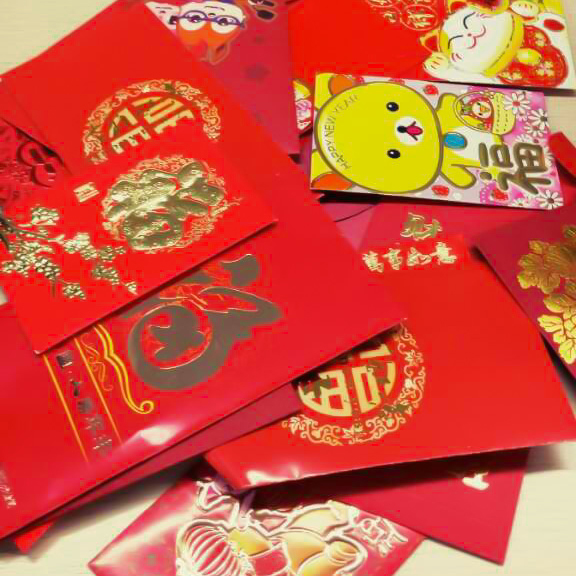
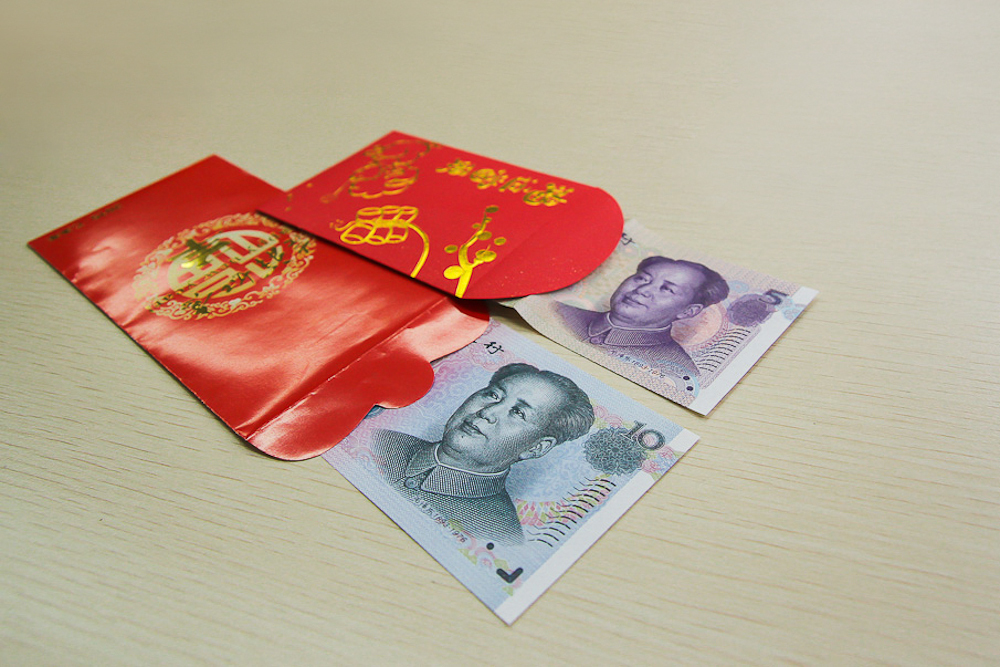
Today, March 5, in China, celebrate the holiday lanterns. This is the last day of the New Year. The dining room serves festive yanxiao - balls of rice dough with filling, fireworks are launched on the street, the Chinese admire lanterns and wish each other happiness. We wish it to you too.
Thanks for attention!
New Year in China is celebrated with the arrival of spring. There is no exact date, each time it is calculated according to the lunar calendar. New Year's Eve falls on the second new moon after the winter solstice on December 21. This time the festive week lasted from February 18 to 24.
According to the legend, the monster Nyan (年, nián, “year”) got into the habit of visiting the village every New Year. Nyan devoured livestock and unwary children. The Chinese decided that the well-fed monster is a harmless monster, and every year they left him food at the entrance doors. One day, Nian got scared of a child in red clothes. Residents quickly realized, and instead of feeding the monster, began to scare him away with red lanterns and fireworks. The nannies left, and the tradition remained.
Our company began preparing for the New Year back in January, when they held an annual corporate event.
In honor of the decade, UCWeb marked the end of the year with a special scale. The company rented a hall with a stage in the Pazhou Exhibition Complex, where the Canton Fair is usually held. The holiday came colleagues from Russia, Indonesia, India and Vietnam.
')

On the stage, summed up and played out gifts. The best employees were given Audi A4 cars. Each department of the company prepared a performance: they danced in bright costumes, sang, showed a theater of shadows and performances based on fairy tales and old school games.



Gifts played in the lottery. The names of all employees were entered into the database, and randomly selected the winners. There were three lotteries in total, each with several types of gifts - they started with cameras and smart watches, then there were mirror cameras and Apple gadgets, and the most successful employees got a trip to any part of the world. According to our calculations, prizes were won by about 600 people. After the event, everyone went to a gala dinner at the hotel. The evening ended in karaoke, he is very loved in Asia.

On the screen the names of the winners in one of the lotteries.
New Year in China is a state holiday, and the country is resting for a week. Many are returning home to families, and the big cities are emptied to the delight of tourists. A week before the New Year, red lanterns are hung on the streets, tangerine trees are set up, and festive buildings with wishes for a good year. Trees are wrapped with festoons and golden paper. The main principle: should be bright.
At the entrance to our office we built an installation with goats.
We asked our Chinese colleagues what the year of the goat meant to them. The answer disappointed us: every year the Chinese zodiac is given less and less significance. For young people, the goat and other symbols of the year are rather decorations. They do not dress up in blue for the New Year, and do not decorate the holiday table with hay.


Mandarin trees decorate the "Hongbao" (红包, hóngbāo, red envelope) with wishes. We will tell about them further.

Lanterns and traditional decorations were hanged in the dining room - images of goats in national costumes, pendants with carps and knots for good luck.



As in Russia, one cannot simply celebrate and celebrate New Year without tangerines. And if we have mandarins have become a tradition for economic reasons, then everything is easier in China. In Chinese, the word Mandarin (桔子, jízi in the Cantonese dialect in the south of the country) sounds almost like “luck” (吉利, jílì), so the more mandarins the better. They are given to each other, sacrificed to the gods in the temples, they eat at lunch and decorate them at home.

In China, they like lotteries and everything related to money and gifts. Before the holidays for the employees launched the application. Participants downloaded photos, and the app automatically rated them. The one who scored more than 90 points received a souvenir with corporate symbols.

Below the photos, the first line with asterisks shows how lucky it is in love, below is luck in money and the last one about health.
After the New Year, we had another lottery. Each employee sent a letter with individual numbers. The main prize was five million yuan (almost 50 million rubles), and the entire prize fund is more than ten million.
Win: 5 yuan (about 50 rubles at the current rate).
And now about the Hongbao. On the New Year, the Chinese exchange envelopes with money for happiness and good luck. There is another tradition here in the south of China: everyone who married or had children for a year distributes symbolic 5-10 yuan in envelopes to friends and colleagues. They can be spent - good luck will not disappear from this. Our office is a huge open space, each floor employs 200 people. And all the morning after the holidays, colleagues looked for newlyweds and privately competed who would collect more Hongbao.


Today, March 5, in China, celebrate the holiday lanterns. This is the last day of the New Year. The dining room serves festive yanxiao - balls of rice dough with filling, fireworks are launched on the street, the Chinese admire lanterns and wish each other happiness. We wish it to you too.
Thanks for attention!
Source: https://habr.com/ru/post/374717/
All Articles